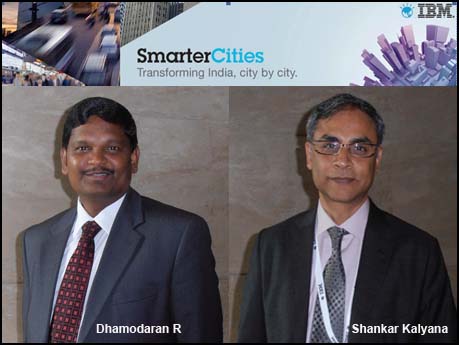
December 17 2012: INDIATECHONLINE SPECIAL
Urban expansion in India is happening at an unprecedented pace and posing challenges that require unique solutions. Our mega cities are going to get denser and 500 new cities will need to be built to take care of the growth and migration. With the growth of newer towns and cities, it becomes critical that our cities are better placed with a futuristic and highly scalable infrastructure with a streamlined urban system. To explore how build sustainable urban centres can be built in India, IBM hosted the Smarter Cities Forum in Delhi, in September 2012. ( More on the global Smarter Cities initiative here )
IndiaTechOnline has reported on this event and brought you some visual highlights. We had the benefit of privileged briefings by Shankar Kalyana, CTO, Global Business Services, IBM India ( Chennai) and Dhamodaran R, Director Smarter Planet Solutions, IBM India ( Bangalore). They underlined the importance of taking the peoples’ pulse before launching large urban renewal programmes -- and shared some the findings of an interesting study of social sentiment that IBM had commissioned in major Indian metros.
As we stand on the edge of a new year, we bring you some more learnings from the IBM Smart Cities Forum and related initiatives which we believe will be increasingly relevant and timely in the months ahead – and serve as a case study of how technology can be deployed to address the urban challenged of the 21st century
"India is urbanizing at an unprecedented speed. Industry sources indicate that by 2030, the urban areas will be home to 40 percent of the country’s people – doubling the urban population within a span of thirty years" says Shanker Annaswamy, Managing Director, IBM India Pvt, "While this implies growing importance of cities as economic hubs, it brings forth a large number of challenges that can only be addressed if citizens and officials work together. Using social sentiment analysis helps city officials leverage a wealth of information from public opinion to make better decisions."
The company also unveiled findings from the latest IBM Social Sentiment Index on traffic, which looked at public sentiment across India’s largest cities -- Bangalore, New Delhi and Mumbai. Analysis of publically available social media showed that the worst congestion is primarily caused by accidents and bad weather (three out of four times) when looking at the three cities together. It also indicated some interesting variations between the cities analyzed. For example, social conversation in Mumbai about stress around traffic is about half as high as Bangalore and New Delhi; references to the impact of rush hour on congestion in New Delhi is between five and seven times more negative than in Bangalore and Mumbai.
Combining the knowledge that population will rapidly increase in Bangalore, Delhi and Mumbai in the coming years, with sentiment on commuters’ preferred mode of transportation, could help these cities more accurately plan for needed investments in transportation infrastructure and its potential impact. City officials could also gauge where public awareness campaigns need to be administered to shift commuters to different modes of transport in order to alleviate growing traffic congestion.
“Like all rapidly growing cities across the world, there are infrastructure growing pains in many Indian cities,” says Guru Banavar, vice president and chief technology officer, Smarter Cities, IBM. “However, when city officials can factor public sentiment – positive, negative or otherwise -- around city services like transportation, they can more quickly pinpoint and prioritize areas that are top of mind for their citizens. This could mean more targeted investment, improving a particular city service, more effective communication about a service that is offered, and even surfacing best practices and successful efforts that could be applied to other zones of a city.”
Public social media content was analyzed by IBM Cognos Consumer Insights, which assessed 168,330 online discussions from September 2011 to September 2012 across social platforms including Twitter, Facebook, Blogs, Forums and News Sources and derived 54,234 High Value Snippets through a series of advanced filtration techniques for insight analysis. The IBM Social Sentiment Index helps companies tap into consumer desires and make more informed decisions by looking at unfiltered consumer attitudes and actions, distinguishing between sincerity and sarcasm, and even predicting trends.
About a year ago, Wave Inc, one of India’s leading diversified business groups, engaged IBM to provide a roadmap to make its green-field township, Wave City, a Smarter Township. Located in Ghaziabad (Uttar Pradesh State), Wave City is among the largest integrated township development projects in India’s National Capital Region. The 4500 acre township will be one of the first urban developments in the country to be designed with smart systems to improve the quality of life for residents while keeping operating costs low and maintaining high levels of service.
As a consulting partner, IBM has developed a roadmap that includes application and technology infrastructure as well as possible revenue models that will enable the township to provide these world-class living amenities to its residents.
All cities are made up of a complex system of systems that are inextricably linked. IBM has assisted Wave City to identify the different systems (for example transport, emergency services, healthcare, water and energy) that make up the township and to understand how these systems interact with and affect each other in order to improve planning and operational efficiency.
Under the recommendations from IBM, a central command centre will integrate and interconnect information from various systems and services within the township to improve safety, prevent and anticipate problems and improve the quality of life of residents. For example a resident’s smart device will be alerted to current traffic conditions or residents can check parking availability or changes to traffic conditions due to large sporting event or a natural disaster like flooding
Infographic on India: Urban effect
Download IBM India Smarter Cities Brochure here